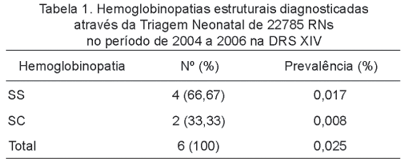Sickle disease is characterized by a genetic alteration which produces hemoglobin S. Neonatal screening for HbS has a major importance in the diagnosis of sickle anemia, thereby enabling preventive treatment in order to reduce childhood morbidity and mortality. Although early diagnosis by neonatal screening is being performed in practically the entire country, what measures are being taken after diagnostic confirmation? We carried out a cross-sectional retrospective study of 22,785 (96.97%) of 23,595 live births submitted to neonatal screening. All tests were performed within the first month of life. Four newborns with HbSS and two with HbSC were diagnosed. The first specialized evaluation occurred between 2 and 9 months after the disease had been identified. Only one case received correct immunization and prophylactic antibiotic therapy. The time between the screening test and the samples arriving at the collecting units was appropriate. Taking into account the necessity of establishing prophylactic treatment at specialized centers, effective communication between healthcare services is essential to safeguard against possible consequences and sequelae related to the disease.
Newborn; sickle disease; neonatal screening


